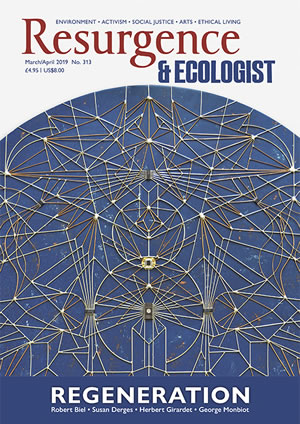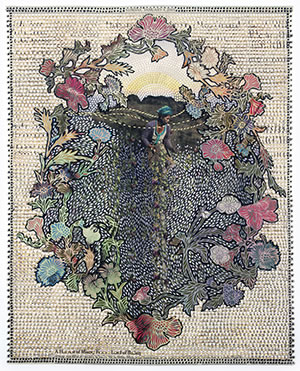We live in a material world – the vast majority of which is single-use. In fact, according to campaign group Circular Economy, just 9% of the billions of tonnes of materials that enter the global economy each year is recycled. As readers of this magazine will be acutely aware, it is this verocious appetite for natural resources that is driving climate breakdown. There is a route out of this, however, and it is circular.
In this issue of Resurgence & Ecologist, we explore the theme of regeneration: a system inspired by Nature, where waste products become sources of new growth.
Regenerative development is the only way we can address the systemic crises of our time: climate change, contamination of rivers and plastic pollution, as Herbert Girardet writes in our Keynotes section. If the economic system is to prosper it must operate like Nature: regeneratively.
In a special section curated by Ecologist editor Brendan Montague, we look at the circular economy and examples of this system in action, from immune-system-building sand pits to the potentials of paper mill sludge. “A circular economy keeps products circulating at their highest value for as long as possible,” writes Ali Moore – an approach that could provide a more stable environment for manufacturers, retailers and consumers post Brexit.
There is even a movement to change our relationship with Nature after we die. In Ethical Living, Catherine Early explores the rising trend of natural burials, and interviews Katrina Spade, who is developing ways to recompose human bodies. “In a forest, organic material grows and then decomposes, and becomes the basis for all new life,” Spade says. “That cycle is quite perfect – how beautiful to be able to create soil out of the dead.”
Regeneration is about nourishing not only the land, but also people, says Laurel Foreman, who runs an organic farm in northern Scotland. The farm, a quarter of which has conservation status, relies on human input and in return provides those people with a sense of freedom and healing. “That’s how the circle goes round,” Foreman says.
This feeling of connection is echoed in our Arts section by photographer Susan Derges, whose work exploring the life cycle of water captures a feeling of longing to reconnect with Nature.
As I write this, David Attenborough’s speech at Davos is making headlines. “The garden of Eden is no more,” he said. We are fundamentally changing Nature, and people need to truly understand what is at stake so that business and governments can “get on with the practical solutions”. Sixteen-year-old Greta Thunberg’s warning at the same event was perhaps more cutting: “I want you to feel the fear I feel every day and then I want you to act.”
A 1.5°C world can only be circular, Circular Economy write in their 2019 report. We can tip the balance against global warming – to do that we have to join the circle and look to a regenerative future.
Finally, we would like to let our readers know that Greg Neale has decided to stand down from his role as Editor-in-Chief at The Resurgence Trust. We wish him all the best for the future.
For more information on the circular economy: tinyurl.com/circularity-gap-report-2019








